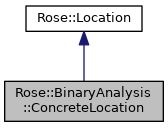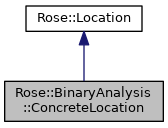Description
Concrete location of data.
A concrete location is a machine register, a concrete memory address, or a memory address calculated from a register's current value and a signed byte offset.
Concrete locations are immutable objects.
See also, AbstractLocation.
Definition at line 29 of file ConcreteLocation.h.
#include <Rose/BinaryAnalysis/ConcreteLocation.h>


Public Types | |
| enum | Type { NO_LOCATION , REGISTER , RELATIVE , ABSOLUTE } |
| Type of location. More... | |
Public Member Functions | |
| ConcreteLocation () | |
| Default constructor. | |
| ConcreteLocation (const ConcreteLocation &) | |
| Copy constructor. | |
| ConcreteLocation & | operator= (const ConcreteLocation &) |
| ConcreteLocation (Address) | |
| Address location. | |
| virtual bool | isValid () const override |
| Test whether this object is valid. | |
| virtual uint64_t | hash () const override |
| Compute a 64-bit hash of this object. | |
| virtual std::string | toString () const override |
| Convert location to string. | |
| virtual void | print (std::ostream &) const override |
| Output location to a stream. | |
| virtual std::string | printableName () const override |
| Convert location to escaped, parsable string. | |
| virtual bool | isEqual (const Location &) const override |
| Equality and inequality. | |
| virtual bool | operator< (const Location &) const override |
| virtual bool | operator<= (const Location &) const override |
| virtual bool | operator> (const Location &) const override |
| virtual bool | operator>= (const Location &) const override |
| void | print (std::ostream &, const RegisterDictionaryPtr &) const |
| Print using the specified register dictionary. | |
| int | compare (const ConcreteLocation &) const |
| Compare two concrete locations. | |
| Type | type () const |
| Type of location. | |
| RegisterDescriptor | reg () const |
| Register part of the location. | |
| Address | address () const |
| Address part of the location. | |
| int64_t | offset () const |
| Offset part of the location. | |
| ConcreteLocation (RegisterDescriptor) | |
| Register location. | |
| ConcreteLocation (RegisterDescriptor, const RegisterDictionaryPtr &) | |
| Register location. | |
| ConcreteLocation (RegisterDescriptor, int64_t offset) | |
| Register and offset location. | |
| ConcreteLocation (RegisterDescriptor, int64_t offset, const RegisterDictionaryPtr &) | |
| Register and offset location. | |
| RegisterDictionaryPtr | registerDictionary () const |
| Property: Register dictionary. | |
| void | registerDictionary (const RegisterDictionaryPtr &) |
| Property: Register dictionary. | |
 Public Member Functions inherited from Rose::Location Public Member Functions inherited from Rose::Location | |
| virtual bool | operator== (const Location &other) const final |
| Equality and inequality. | |
| virtual bool | operator!= (const Location &other) const final |
| Equality and inequality. | |
| virtual | operator bool () const final |
| Test whether this object is valid. | |
| virtual bool | operator! () const final |
| Test whether this object is empty. | |
| virtual bool | isEmpty () const final |
| Test whether this object is empty. | |
Static Public Member Functions | |
| static ConcreteLocation | parse (const std::string &) |
| Parse a concrete location from a string. | |
Member Enumeration Documentation
◆ Type
Type of location.
Definition at line 32 of file ConcreteLocation.h.
Constructor & Destructor Documentation
◆ ConcreteLocation() [1/6]
| Rose::BinaryAnalysis::ConcreteLocation::ConcreteLocation | ( | ) |
Default constructor.
Constructs a concrete location that does not refer to any location. The isEmpty method return true for such objects.
◆ ConcreteLocation() [2/6]
|
explicit |
Register location.
Construct a concrete location that refers to a register. The optional register dictionary can be associated with the location and is only used when printing the location.
◆ ConcreteLocation() [3/6]
|
explicit |
Register location.
Construct a concrete location that refers to a register. The optional register dictionary can be associated with the location and is only used when printing the location.
◆ ConcreteLocation() [4/6]
|
explicit |
Address location.
Construct a concrete location that refers to an address in memory.
◆ ConcreteLocation() [5/6]
| Rose::BinaryAnalysis::ConcreteLocation::ConcreteLocation | ( | RegisterDescriptor | , |
| int64_t | offset | ||
| ) |
Register and offset location.
Construct a concrete location that refers to an address in memory calculated by adding a register's value and a signed byte offset. The optional register dictionary can be associated with the location and is only used when printing the location.
◆ ConcreteLocation() [6/6]
| Rose::BinaryAnalysis::ConcreteLocation::ConcreteLocation | ( | RegisterDescriptor | , |
| int64_t | offset, | ||
| const RegisterDictionaryPtr & | |||
| ) |
Register and offset location.
Construct a concrete location that refers to an address in memory calculated by adding a register's value and a signed byte offset. The optional register dictionary can be associated with the location and is only used when printing the location.
Member Function Documentation
◆ isValid()
|
overridevirtual |
Test whether this object is valid.
Implements Rose::Location.
◆ hash()
|
overridevirtual |
Compute a 64-bit hash of this object.
Implements Rose::Location.
◆ toString()
|
overridevirtual |
Convert location to string.
Returns a string representation of the location. This representation is not necessarily parsable.
See also, print.
Implements Rose::Location.
◆ print() [1/2]
|
overridevirtual |
Output location to a stream.
The format is the same as the toString method and is not necessarily parsable.
See also, toString.
Implements Rose::Location.
◆ printableName()
|
overridevirtual |
Convert location to escaped, parsable string.
Returns a string that can be safely emitted to a terminal. The format should also be parsable so the static parse method in subclasses can create an equal object from the string.
Implements Rose::Location.
◆ isEqual()
|
overridevirtual |
Equality and inequality.
Objects are equal if they are the same type and they point to the same location. Otherwise they are unequal.
The operator== is implemented in the base class only. For the expression a == b it calls both a.isEqual(b) and b.isEqual(a), returning true only if both tests return true. Subclasses should implement x.isEqual(y) by dynamic casting y to the type of x and returning true if and only if the cast succeeds and x and y point to the same location.
The operator!= is implemented in the base class as the complement of operator==.
Implements Rose::Location.
◆ operator<()
|
overridevirtual |
Implements Rose::Location.
◆ operator<=()
|
overridevirtual |
Implements Rose::Location.
◆ operator>()
|
overridevirtual |
Implements Rose::Location.
◆ operator>=()
|
overridevirtual |
Implements Rose::Location.
◆ print() [2/2]
| void Rose::BinaryAnalysis::ConcreteLocation::print | ( | std::ostream & | , |
| const RegisterDictionaryPtr & | |||
| ) | const |
Print using the specified register dictionary.
Concrete locations have an optional internal register dictionary pointer that's usually used for printing, but this method provides a way to use some other register dictionary.
◆ compare()
| int Rose::BinaryAnalysis::ConcreteLocation::compare | ( | const ConcreteLocation & | ) | const |
Compare two concrete locations.
Returns negative if this location is less than the other, positive if this location is greater than the other, or zero if this and the other location are equal.
◆ registerDictionary() [1/2]
| RegisterDictionaryPtr Rose::BinaryAnalysis::ConcreteLocation::registerDictionary | ( | ) | const |
Property: Register dictionary.
This is the optional register dictionary associated with this location and used when printing the location.
◆ registerDictionary() [2/2]
| void Rose::BinaryAnalysis::ConcreteLocation::registerDictionary | ( | const RegisterDictionaryPtr & | ) |
Property: Register dictionary.
This is the optional register dictionary associated with this location and used when printing the location.
◆ reg()
| RegisterDescriptor Rose::BinaryAnalysis::ConcreteLocation::reg | ( | ) | const |
Register part of the location.
Returns the register part of the location. This returns a valid register descriptor if the location is either a register or an indirect (register plus offset) memory address. Otherwise it returns the empty register descriptor.
◆ address()
| Address Rose::BinaryAnalysis::ConcreteLocation::address | ( | ) | const |
Address part of the location.
Returns the address of the location if the location is a simple memory address. Otherwise, if the address is formed from a base register and an offset, or if the location is a register, then zero is returned.
◆ offset()
| int64_t Rose::BinaryAnalysis::ConcreteLocation::offset | ( | ) | const |
Offset part of the location.
Returns the signed offset when the location is a memory address formed from a register base value and an offset. Otherwise it returns zero.
The documentation for this class was generated from the following file: